Ramen Eggs, also known as Ajitsuke Tamago, are a delightful addition to any ramen bowl, elevating your meal to new heights with their rich flavor and creamy texture. These marinated soft-boiled eggs are a staple in Japanese cuisine, renowned for their umami-packed soy sauce and mirin glaze. With their visually appealing golden yolk and glossy exterior, Ramen Eggs not only enhance the flavor profile of your dish but also add a touch of elegance. Whether you’re a ramen enthusiast or a novice cook, mastering this recipe will bring authentic Japanese flavors right to your kitchen.
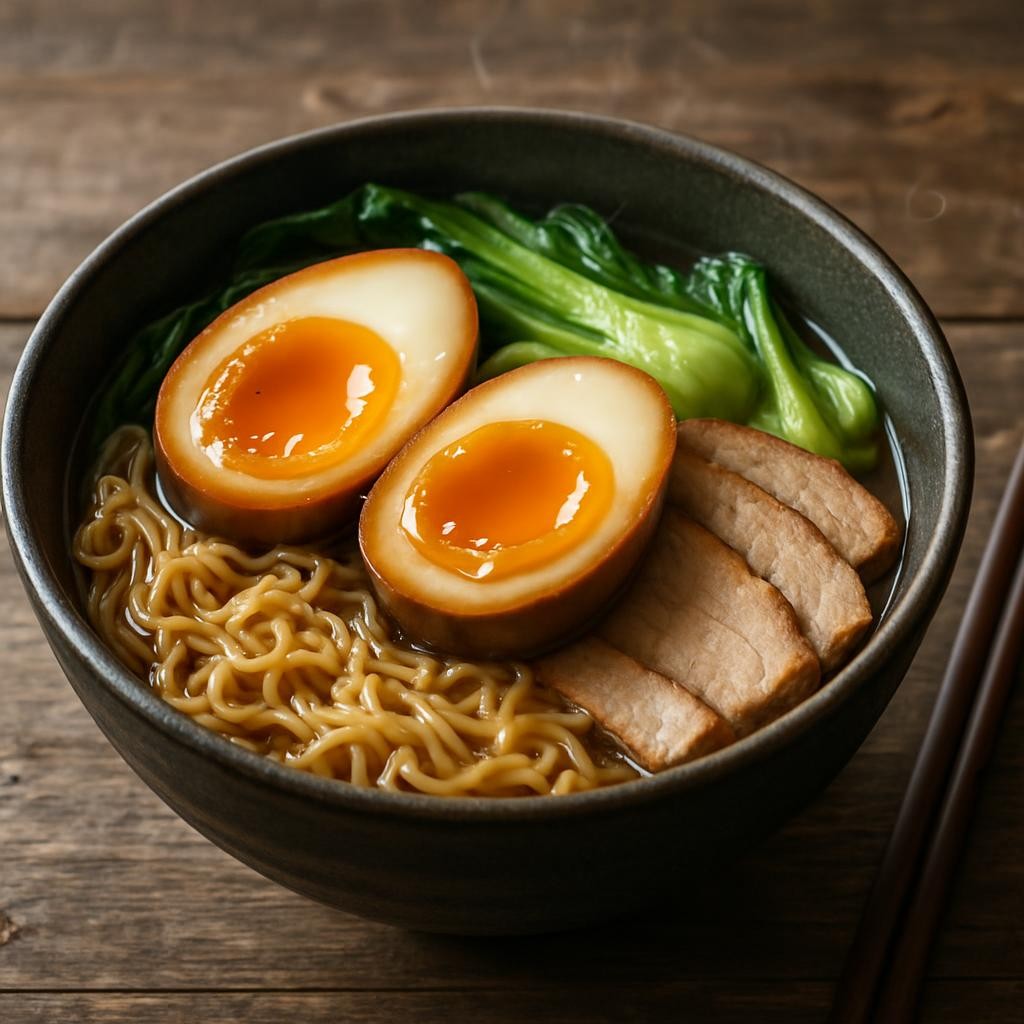
Why You Will Love This Recipe
You’ll fall in love with this recipe for several reasons! Firstly, the flavor is simply irresistible; the combination of soy sauce, mirin, and a hint of sweetness creates a tantalizing marinade that seeps into the egg, resulting in a burst of savory goodness with every bite. Secondly, making Ramen Eggs is surprisingly easy and requires minimal ingredients and cooking time. This recipe is perfect for busy weeknights or meal preps, as it can be made in advance and stored for later use. Lastly, these eggs fit seamlessly into various diets, whether you’re enjoying a hearty ramen bowl, a salad, or even on their own as a protein-packed snack.
Tips and Tricks
To ensure your Ramen Eggs turn out perfectly every time, here are some tips and tricks:
- Use fresh, room-temperature eggs for better results; they peel more easily after boiling.
- For a perfectly soft-boiled egg, cook the eggs for exactly 6-7 minutes before plunging them into an ice bath.
- Allow the eggs to marinate for at least 4 hours for the best flavor, but overnight is even better!
- Experiment with the marinade by adding ingredients like garlic, ginger, or chili flakes for an extra punch of flavor.
Make Ahead Tips
Ramen Eggs are perfect for meal prep! You can boil and marinate them a few days in advance. Once marinated, they can stay fresh in the refrigerator for up to a week. Consider preparing a batch on the weekend and using them throughout the week in your ramen, salads, or as a quick snack. Just remember to keep them in an airtight container to maintain their flavor and texture.
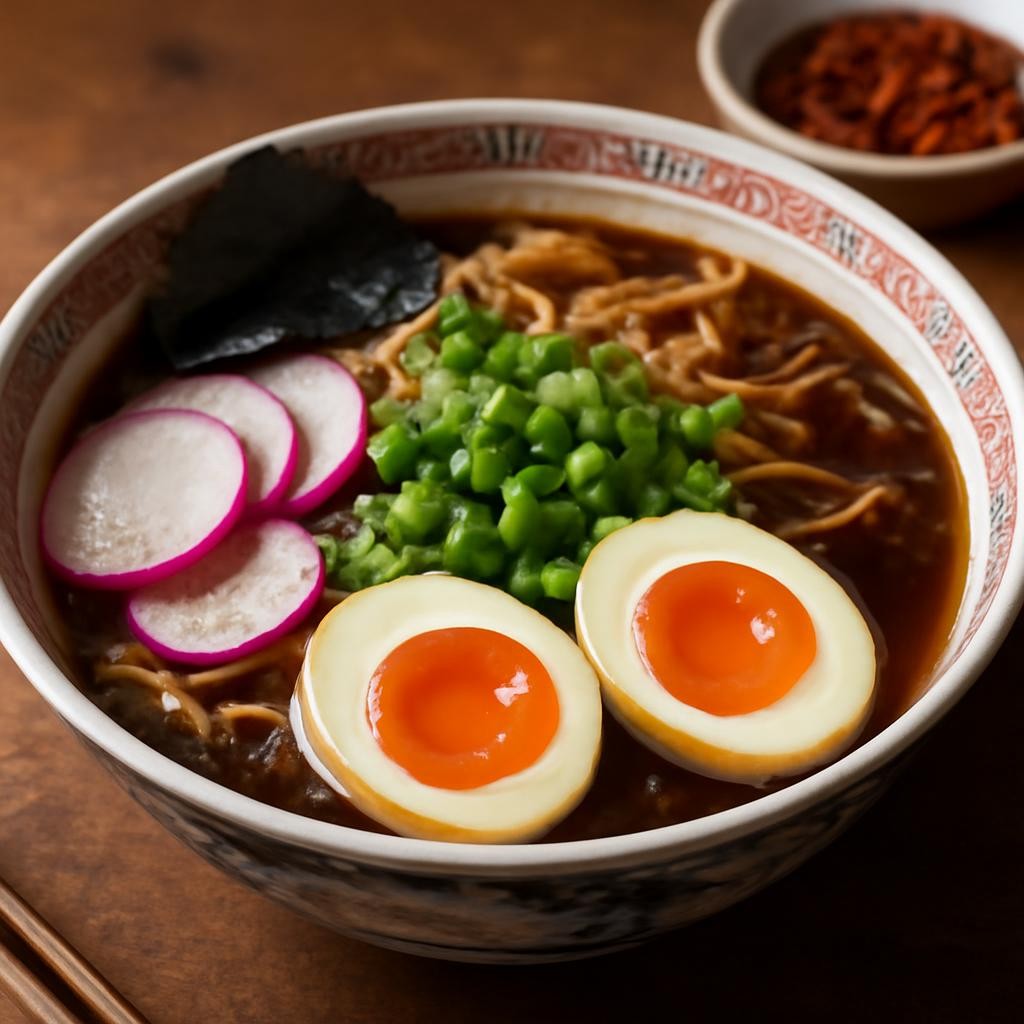
Recipe Variations
Feel free to get creative with your Ramen Eggs! Here are some variations to try:
- Add a splash of sesame oil to the marinade for a nutty flavor.
- Experiment with different types of soy sauce, like tamari for a gluten-free option, or a sweet soy sauce for a different taste.
- Try adding a few slices of fresh chili or a pinch of red pepper flakes for a spicy kick.
- If you’re looking to make a vegetarian version, substitute the soy sauce with a mushroom-based sauce.
How to Serve
To serve your Ramen Eggs, slice them in half to reveal the glorious golden yolk, and place them on top of a steaming bowl of ramen. Garnish with sliced scallions, sesame seeds, or a sprinkle of nori for added texture and flavor. You can also enjoy them on their own as a part of a bento box or alongside rice and pickled vegetables for a simple yet delightful meal.
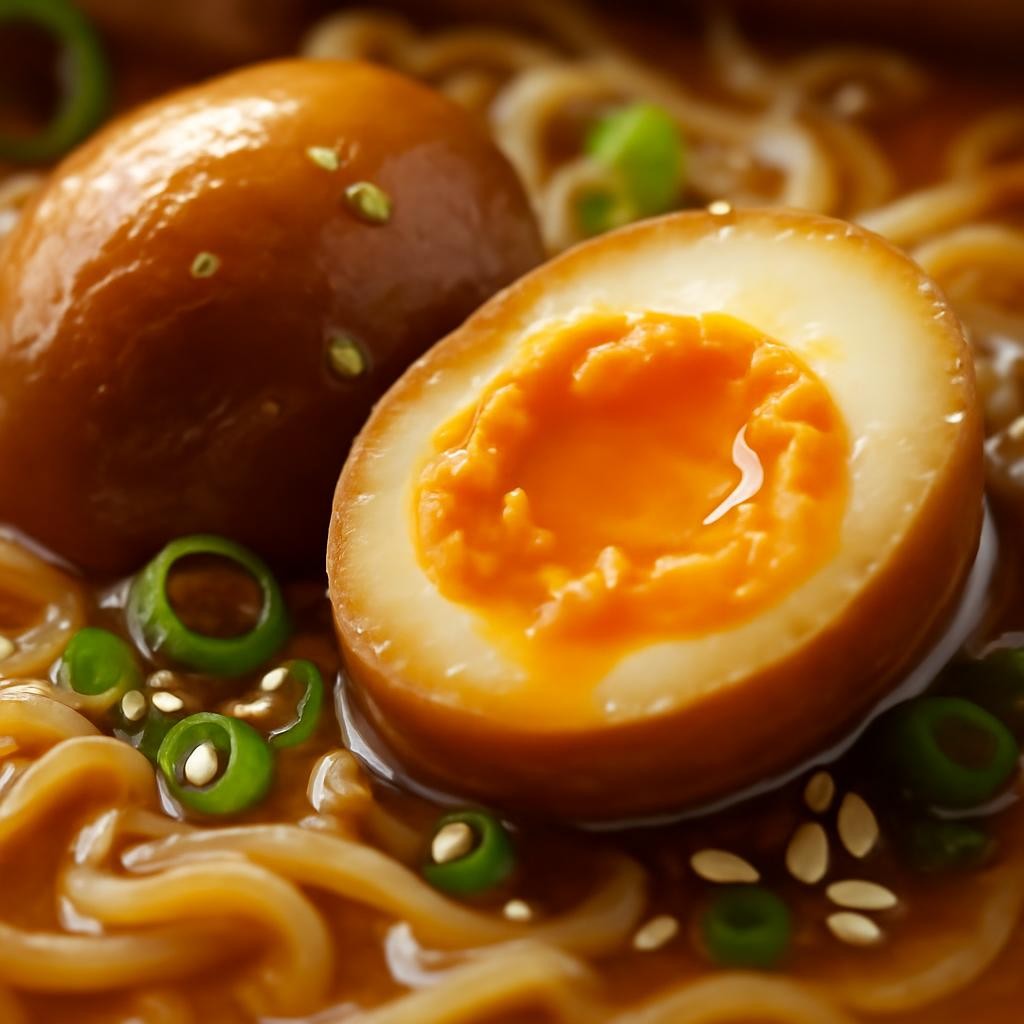
Pairing Suggestions
Ramen Eggs pair beautifully with a variety of drinks and side dishes. For a beverage, consider serving a light, crisp sake or a sparkling green tea to cleanse the palate. If you prefer something warmer, a cup of miso soup would complement the flavors nicely. For dessert, try a light matcha mousse or mochi to round off your meal with a hint of sweetness.
How to Store
To store your Ramen Eggs, place them in an airtight container in the refrigerator. They will stay fresh for up to a week. If you want to freeze them, it’s best to do so without the marinade. Wrap them tightly and store them in the freezer, where they can last for up to a month. To reheat, simply place the eggs in warm water for a few minutes or let them thaw overnight in the fridge before enjoying.
Equipment Needed
For this recipe, you’ll need:
- A medium-sized pot for boiling the eggs
- A heatproof bowl for the ice bath
- A whisk or fork for mixing the marinade
- An airtight container for marinating and storing the eggs
No specialized equipment is necessary, making this recipe accessible to everyone!
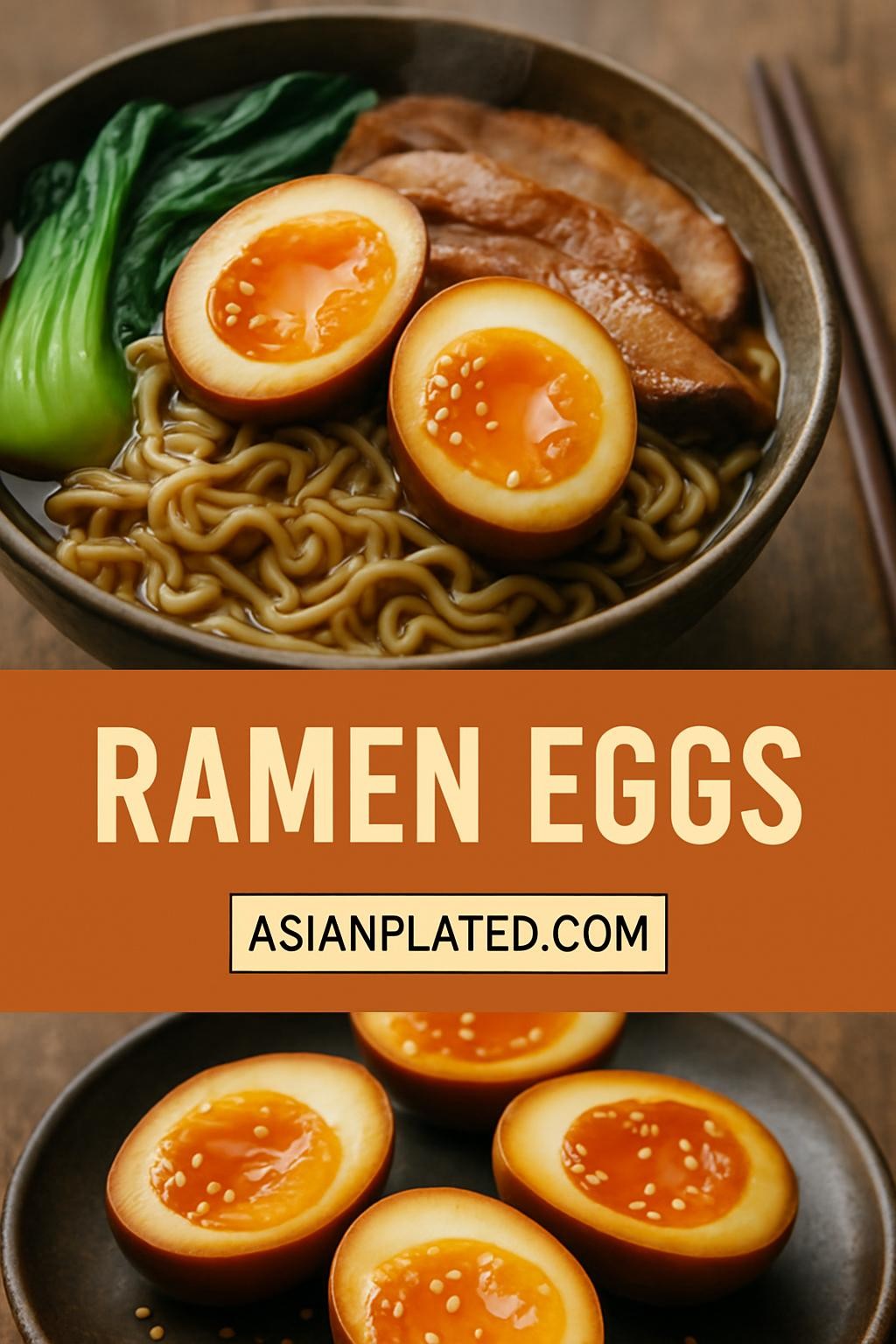
Dietary Adaptations
For those with dietary restrictions, here are some adaptations you can make:
- To make it vegan, use silken tofu or chickpea flour eggs instead of traditional eggs.
- For a gluten-free option, use tamari instead of regular soy sauce in the marinade.
- If you’re dairy-free, this recipe is already suitable, but ensure any accompanying dishes or sides also meet your dietary needs.
Seasonal Adaptations
Depending on the season, you can modify the recipe to incorporate fresh ingredients:
- In spring, add fresh herbs like chives or cilantro to the marinade for a burst of freshness.
- During the summer, consider adding a splash of citrus juice or zest for a bright flavor enhancement.
- In the fall, infuse the marinade with warming spices like cinnamon or star anise for a cozy twist.
Recipe FAQs
Q: Can I use hard-boiled eggs instead?
A: While you can, the traditional Ramen Egg is soft-boiled to achieve that creamy yolk texture, which is what makes them unique.
Q: How long should I marinate the eggs?
A: For optimal flavor, marinate for at least 4 hours, but overnight is ideal.
Q: Can I substitute the soy sauce?
A: Yes, you can use tamari for gluten-free or coconut aminos for a soy-free option.
Q: How do I peel soft-boiled eggs easily?
A: Cooling the eggs in an ice bath after boiling helps the shells come off smoothly.
Ramen Eggs
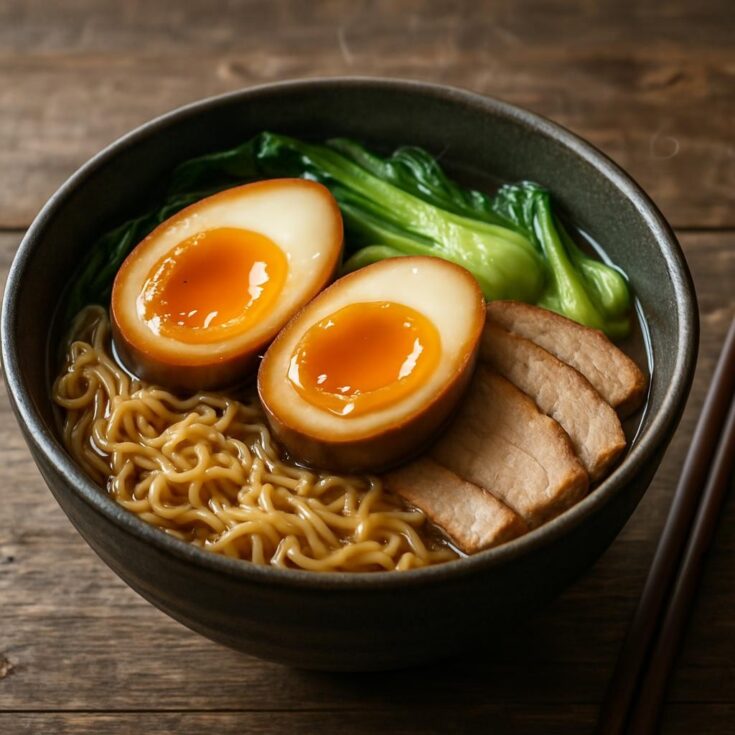
Ramen Eggs, also known as Ajitsuke Tamago, are a delightful addition to any ramen bowl, elevating your meal to new heights with their rich flavor and creamy texture.
Ingredients
- 4 large eggs
- 1/4 cup soy sauce
- 1/4 cup mirin
- 1 tablespoon sugar
- 1 tablespoon water
- Optional: sliced scallions or sesame seeds for garnish
Instructions
- Boil the eggs: Fill a medium pot with water and bring it to a rolling boil. Gently lower the eggs into the water and boil for 6-7 minutes.
- Prepare ice bath: While the eggs are boiling, prepare a bowl with ice water.
- Ice bath: After 6-7 minutes, transfer the eggs immediately to the ice bath and let them cool for at least 5 minutes.
- Make the marinade: In a separate bowl, whisk together the soy sauce, mirin, sugar, and water until the sugar dissolves.
- Peel the eggs: Gently tap the cooled eggs on a hard surface and peel them under running water to help remove the shell.
- Marinate: Place the peeled eggs in the marinade and cover. Refrigerate for at least 4 hours, preferably overnight.
- Serve: When ready to serve, slice the eggs in half and garnish as desired.
Nutrition Information:
Yield: 4 Serving Size: 1Amount Per Serving: Calories: 169Total Fat: 8gSaturated Fat: 2gTrans Fat: 0gUnsaturated Fat: 6gCholesterol: 186mgSodium: 948mgCarbohydrates: 13gFiber: 1gSugar: 10gProtein: 9g
Asianplated.com, occasionally offers nutritional information for recipes contained on this site. This information is provided as a courtesy and is an estimate only. This information comes from online calculators. Although allchickenrecipes.com attempts to provide accurate nutritional information, these figures are only estimates.
Final Thoughts
Making Ramen Eggs at home is a fulfilling culinary experience that adds a touch of authenticity to your ramen dishes. With a few simple ingredients and some patience, you can create these delicious marinated eggs that will impress your family and friends. Don’t hesitate to experiment with flavors and make this recipe your own. Happy cooking, and enjoy the delicious journey into the world of Japanese cuisine!
